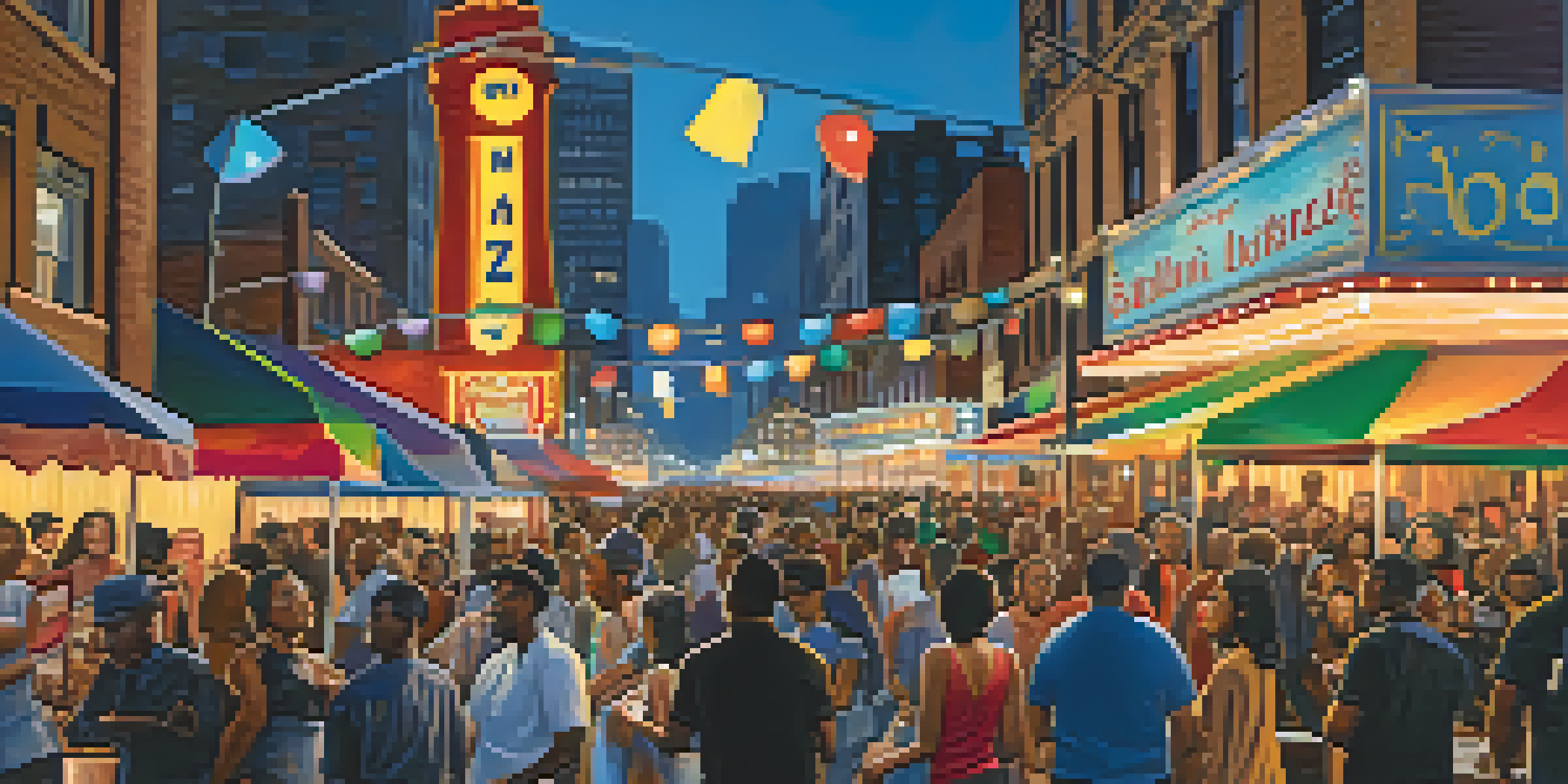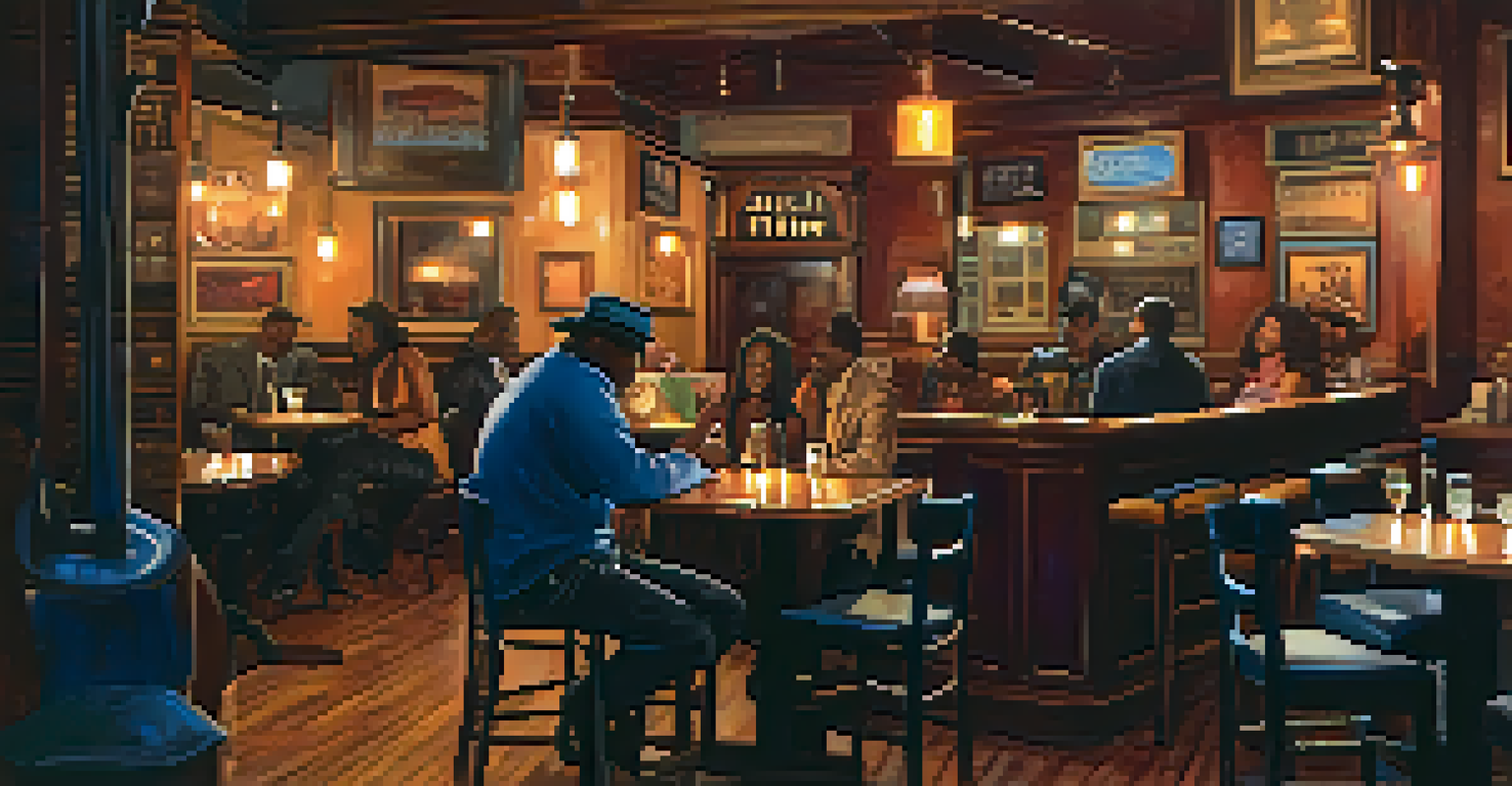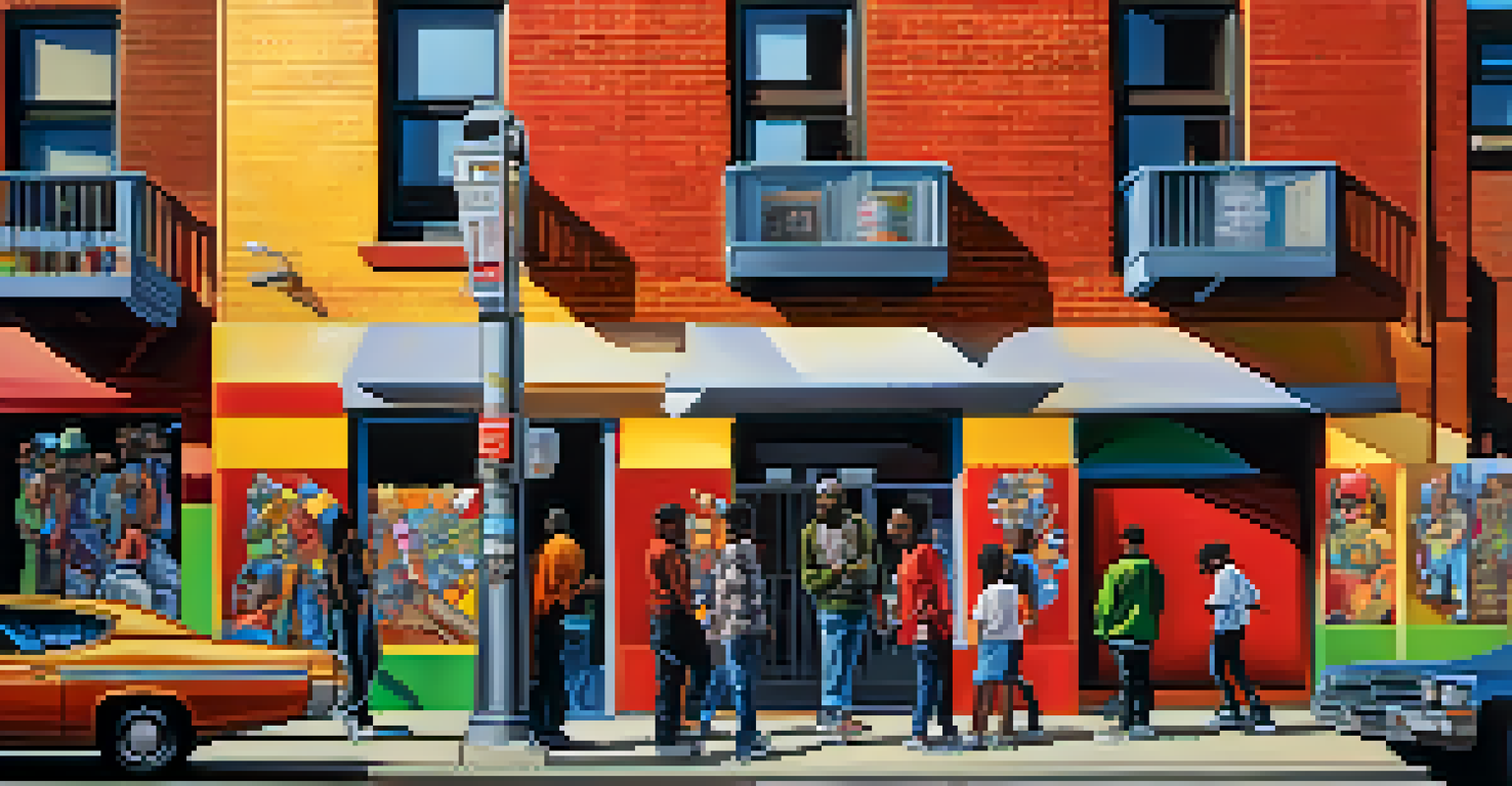Cultural Influences: How Chicago Music Reflects Diversity

The Melting Pot: Chicago's Musical Roots
Chicago is often described as a melting pot, and nowhere is this more evident than in its music scene. From jazz and blues to hip-hop and house, the city's soundscape is a rich tapestry woven with influences from various cultures. Each genre tells a story of the diverse communities that have made Chicago their home, reflecting their struggles, celebrations, and everyday lives.
Music is the shorthand of emotion.
Take blues music, for instance. Originating from African American communities, it captures the essence of hardship and resilience, deeply rooted in the city's history. Similarly, jazz emerged as a creative outlet for African American musicians, blending elements from African rhythms and European harmonies to create something uniquely Chicagoan.
This diversity in music not only highlights the city's cultural mosaic but also fosters collaboration among artists. Musicians often draw inspiration from one another, leading to innovative sounds that continue to evolve over time. In this way, Chicago's musical roots serve as a powerful reminder of the city's rich cultural heritage.
Blues: The Voice of Chicago's African American Community
Blues music holds a special place in Chicago’s identity, having developed from the African American experiences in the early 20th century. Artists like Muddy Waters and Howlin' Wolf brought the Delta blues to the urban landscape, infusing it with their unique styles. Their music not only entertained but also provided a voice to the struggles faced by their communities, making blues a significant cultural expression.

The Chicago blues sound is characterized by electrifying guitar riffs and soulful lyrics, often reflecting themes of love, loss, and resilience. Clubs along the city’s South Side became hubs for these musicians, where they could showcase their talents and connect with fans. This vibrant atmosphere contributed to the genre's growth and solidified Chicago's reputation as the birthplace of modern blues.
Chicago's Rich Musical Diversity
Chicago's music scene is a vibrant blend of genres like blues, jazz, hip-hop, and house, reflecting the city's diverse cultural influences.
Today, blues festivals celebrate this rich history, attracting enthusiasts from around the globe. These events not only honor past legends but also promote current artists, ensuring that the blues continues to thrive. The legacy of Chicago blues remains a testament to the strength and creativity of its African American community.
Jazz: A Fusion of Cultures and Styles
Jazz is another genre that epitomizes Chicago's cultural diversity, evolving from various musical traditions and influences. The city's jazz scene emerged during the Great Migration when African Americans from the South brought their musical heritage with them. This fusion of styles led to the development of a distinct Chicago jazz sound, marked by improvisation and vibrant performances.
Jazz is the music of the moment, a reflection of the thoughts and feelings of its time.
Prominent figures like Louis Armstrong and Nat King Cole made significant contributions to the genre, pushing its boundaries and bringing it to a wider audience. Jazz clubs like the famous Green Mill Cocktail Lounge became essential venues where artists could experiment and collaborate, creating an exciting and dynamic musical environment.
Today, jazz festivals and events continue to celebrate this rich legacy, attracting diverse audiences. The genre remains a vital part of Chicago's cultural fabric, showcasing the city's ability to blend different influences into something truly unique. Jazz not only entertains but also serves as a powerful reminder of the city’s ever-evolving cultural narrative.
Hip-Hop: Voices of the New Generation
In recent decades, hip-hop has emerged as a dominating force in Chicago's music scene, representing the voices of a new generation. With its roots in African American culture, this genre addresses contemporary issues, including social injustice, poverty, and identity. Artists like Chance the Rapper and Common have made significant contributions, bringing Chicago's stories to the forefront of the national stage.
The city's hip-hop culture is not just about music; it's a movement that encompasses fashion, art, and lifestyle. Neighborhoods like Englewood and West Side have become hotbeds for emerging talent, showcasing the creativity and resilience of their communities. Through their lyrics and performances, these artists challenge stereotypes and inspire hope among their listeners.
Blues as Cultural Expression
Blues music serves as a powerful voice for Chicago's African American community, capturing their struggles and resilience throughout history.
Moreover, Chicago's hip-hop scene fosters collaboration among artists from various backgrounds, making it a melting pot of ideas. This diversity enriches the genre, creating a unique sound that resonates with audiences both locally and globally. Hip-hop in Chicago is a powerful testament to the city’s ongoing evolution and its commitment to celebrating cultural diversity.
House Music: The Birthplace of a Global Phenomenon
House music, a genre that emerged from Chicago's underground dance scene in the 1980s, is a prime example of the city's cultural influences. Originating from disco, house music quickly evolved, incorporating elements from funk, soul, and electronic music. The Warehouse club, where DJ Frankie Knuckles spun records, played a pivotal role in shaping this genre, giving it its name and establishing Chicago as its birthplace.
House music is characterized by its repetitive beats and synthesizer-driven melodies, creating an infectious rhythm that invites people to dance. Its rise to popularity not only transformed Chicago's nightlife but also spread globally, influencing music scenes around the world. This genre exemplifies how local cultures can lead to worldwide movements, showcasing Chicago's impact on global music trends.
Today, house music festivals and events attract fans from all walks of life, celebrating its rich heritage. The genre continues to evolve, with new artists pushing boundaries and exploring innovative sounds. Chicago's house music scene remains a vibrant and essential part of the city's cultural identity, reflecting its diverse community and artistic spirit.
Cultural Festivals: Celebrating Musical Diversity
Cultural festivals in Chicago play a vital role in showcasing the city's musical diversity. Events like the Chicago Blues Festival and the Chicago Jazz Festival bring together artists and fans, celebrating the rich heritage of these genres. These gatherings not only honor past legends but also provide a platform for emerging talent, fostering a sense of community and connection among attendees.
During these festivals, attendees experience a wide array of performances, from traditional styles to contemporary interpretations. Food vendors, art displays, and workshops further enrich the experience, creating a multi-sensory celebration of culture. These events highlight the importance of music as a means of expression and unity, reflecting the diverse backgrounds of Chicago’s residents.
Future of Music: Innovation Ahead
The future of Chicago's music is bright, with new artists emerging and technology enabling broader collaboration and creativity.
Moreover, cultural festivals in Chicago encourage collaboration among artists from different genres, fostering innovation and creativity. This cross-pollination of ideas leads to exciting new sounds and collaborations that continue to shape the city's music scene. In this way, these festivals not only preserve the past but also inspire the future of Chicago's diverse musical landscape.
The Future of Chicago Music: A Cultural Tapestry
As Chicago's music scene continues to evolve, it remains a vibrant tapestry of cultural influences. The blending of genres and styles reflects the city’s ever-changing demographics and artistic expression. New artists are emerging from every corner of the city, bringing fresh perspectives and unique sounds that contribute to the rich musical landscape.
Moreover, technology plays a significant role in shaping the future of music in Chicago. With the rise of digital platforms, artists can reach wider audiences and collaborate with musicians around the globe. This accessibility fosters an environment where creativity knows no bounds, allowing the city’s diverse musical heritage to thrive.

Looking ahead, Chicago's music scene is poised to remain a beacon of cultural diversity and innovation. As artists continue to draw inspiration from their surroundings and each other, the city will undoubtedly produce sounds that reflect its rich history and the ongoing narrative of its communities. The future of Chicago music promises to be as dynamic and diverse as the city itself.